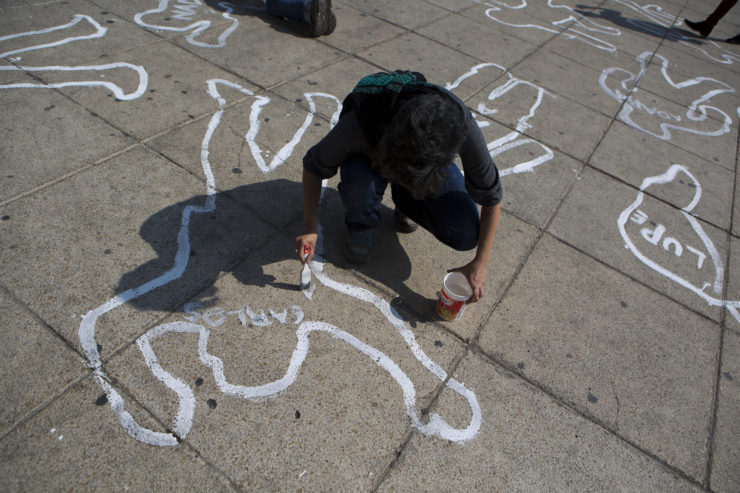
A woman paints the name of a victim of the Mexican drug war onto a body outline as part of a memorial for those killed at the Monument for the Mexican Revolution in Mexico City in December 2016, the 10th anniversary of the drug war's start
(Translated from the Spanish by Dick Cluster. Leer en español.)
In some parts of Mexico, the majority of reporters have been silenced by means of torture. I first learned about this by reading the reports of organizations devoted to freedom of expression, but over time I began to meet colleagues who had suffered it in the flesh.
Some of them are from places like Tamaulipas, a state bordering Texas, where drug traffickers assign journalists to call colleagues and inform them what articles should not be published (which crimes should remain unknown) or what orders they must obey (such as photographing and publishing the dismembered body of a murdered enemy of a cartel). The same thing happens in states all along the Gulf of Mexico.
In areas like Coahuila, another Texas border state, reporters receive instructions from drug traffickers, sometimes face-to-face and sometimes over the phone, saying not to publish anything about crimes that are already known. Sometimes the instructions dictate rules of coverage and even a sort of style manual in which, for instance, journalists should never write of hitmen or assassins, only of “unidentified armed individuals.” Or never write that the traffickers “flee” when the army arrives to fight them; the correct expression is “left the scene,” because they do not want to be depicted as cowards.
Those who don’t follow the rules are kidnapped for hours or days and submitted to a form of torture that, from being so common, even has a name: tablazo. A tabla is a board; a tablazo is the action of subduing someone and tying them up so they can be beaten, including being hit repeatedly with a board. The force and duration of the punishment is such that reporters are left with their bodies covered with bruises and they are unable to sit or lie down for weeks.
That is the punishment trademarked by one of the cartels as its warning to those who interfere with its business.
In recent years when I’ve had to travel from Mexico City, where I work, to the northeastern border of the country, I have met more and more reporters in areas dominated by the narcotics industry who have personal stories of torture they have never been able to tell.
Five years ago, through the organization Periodistas de a Pie and with the help of the Dart Center for Journalism and Trauma, I organized a workshop on stress alleviation to which we invited 20 reporters from all over the country. Soon the attendees were telling their accumulated accounts of terror: kidnapping, torture, being held at gunpoint, being attacked even in their workplaces. More than once we cried together.
At about this time, Dr. Anthony Feinstein, famous for his book“Journalists Under Fire: the Psychological Hazards of Covering War,” came to Mexico to study the impacts of the “war against drugs” on Mexican journalists covering the violence. He found levels of trauma equivalent to those of soldiers in war.
I soon discovered that in areas like Tamaulipas there is a generation of journalists silenced through torture, journalists who have never received any care or attention and who have lived with their own private nightmares for years.
Last year I was at a workshop on safety for border-area journalists, held in Texas. Such events are held outside Mexico so that journalists from the silenced regions can feel safer and run fewer risks. When a psychologist gave a talk on post-traumatic stress, PTSD, I began to see the effects those words have on people who have suffered torture.
A reporter seated next to me began to tremble in his seat, anxiety making him unable to control himself.
Afterward, he told me he had been “lifted” (the criminal slang by which we usually refer to temporary kidnapping) and “boarded” for having published information about a corrupt politician. The politician asked for help from the drug traffickers, who came for the reporter, to punish and silence.
After this punishment he was dropped on the street. When he arrived at the paper where he worked and told his boss what had happened, the boss locked his office door and confessed in a whisper that he too had been tortured.
“I ran into to my torturer several times on my way to work,” the reporter told me. “He often went to the same government offices I was assigned to cover, sometimes we saw each other from a distance.” This image terrified me.
“When were you able to sleep soundly again?” I asked
“When I found out my torturer had been murdered.”
In whole regions of Mexico, journalists cannot denounce the threats or torture they suffer because they know that the politicians, government officials, and police protect the organized crime groups or are complicit with them. Impunity is a constant. The murderers and torturers go free. No one attempts to prosecute them.
Another workshop attendee launched constant questions toward the psychologist. “You mean I’m really not crazy?” he asked.
He was one of the survivors of the frequent bombings of newspaper offices in reprisal for the news they publish. Another attendee had been kidnapped and was alive only through pure luck.
I found that the majority of journalists around me had some history of corporal punishment to tell, of physical torture as well as psychological scars.
Over dinner, one obviously moved attendee said this trip to Texas had allowed him to catch up on some of the sleep he had missed. At home he was always awake, intent on noises from the street, traumatized by the idea that they might come for him and kidnap him again.
There are many stories like his. Whenever I am asked what kind of help Mexican journalists need, one of the first ideas that comes to mind is expert psychological help for the thousands of traumatized individuals who have survived the daily work of covering the war zones that their home towns have become.


